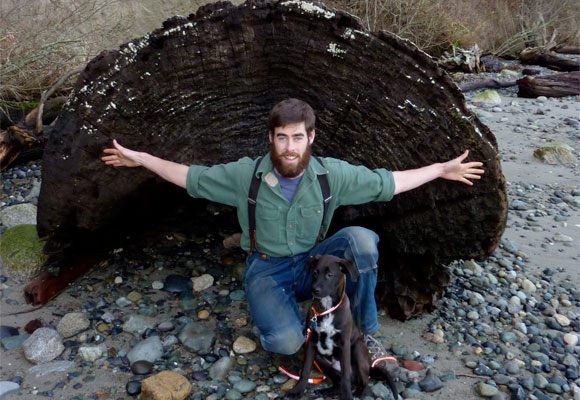
Course Outline
- Assignments
- Field Exercises
- Final Exam
Course Description
Student Profile
Tristan Banwell, UBC Forestry Graduate

The “course gets students out into the forest to do some basic surveying, which is an excellent way to learn.”
The land that supports the forest resource is also the base of numerous other resources that function with the forest. The significant social and economic benefit realized by harvesting and conserving the timber resource must be balanced by wise management practices that will recognize and conserve the non-timber resources on the same land base. Forest Operations I & II will provide you with a basic understanding of these issues within forest practices. This course will focus on individual roads and harvest areas and will provide the basis for FOPR 362, which more specifically addresses harvesting systems and the broader issues of forest operations planning at a landscape level. FOPR 262 is offered in September, January and May and runs for 8 months. Prerequisites: FOPR 162, or permission of the instructor
Intended Student
As a prospective student, you will have a basic knowledge of forest measurements and surveys and will be familiar with the equipment used in the field and office. This course is designed to meet the needs of several student types:
- Students who, prior to entering the Faculty of Forestry at UBC, want to complete some of the required courses in the BSF program. These individuals are generally entering from other programs, transferring from community colleges, or are students progressing from a technical program after having worked in a forest resource environment.
- Professionals and technicians associated with or working directly in forest resource management who wish to advance their professional credentials while maintaining their employment. Many of these people have related degrees or diplomas in biology, botany, or applied sciences, environmental sciences, but do not have all the course requirements to become a professional forester (RPF) or a professional forest engineer (P.Eng.).
- Any individual interested in advancing their knowledge of this phase of the management of forest resources.
Course Objectives
Among the objectives identified as important to a basic understanding of Forest Operations is for you to:
- Recognize the physical and economic attributes of alternative road and harvesting systems;
- Be prepared to incorporate methods of mitigation and optimization, taking technical work through the processes of professional and managerial decision-making;
- Understand the components of Forest Operations;
- Understand reasons for studying Forest Operations;
- Identify the components of Forest Development and Technical Planning
Course Overview
The course is divided into 9 modules:
Module 1: The Scope of Forest Operations
Module 2: Sources of Information Reconnaissance Control Points
Module 3: Road Surveys
Module 4: Earth Work
Module 5: Road Standards
Module 6: Water Management
Module 7: Road Construction: Methods and Procedures, Maintenance, Decommission, Costing.
Module 8: Harvesting Systems: Falling Through Hauling
Module 9: Harvest Design and Layout
Evaluation
Your course grade will be based on the following breakdown of marks:
- Field Excercises and Assignments – 60%
- Final Exam – 40%
The course will be completed within an 8-month period.
Field Exercises
Most of the assignments in this course involve the field application of the concept covered in the lessons. That means that you will have to get outside with the appropriate instruments and do it. While all of the assignments can be done alone (with a little ingenuity) it would usually be helpful to have a second person to provide some physical assistance. An assistant does not need any special training. You will just use them to help with measurements. You can make the assignments a family exercise, a test of friendship, or you may even be able to incorporate it into your job.
Final Exam
The Final Exam will be an invigilated, 2.5-hour session at a convenient location.
Textbooks and Readings
There are no required textbooks for the course. Rather, you will be asked to complete a variety of readings. Most readings are available online.
FOPR262 Textbook Order Form – optional text
